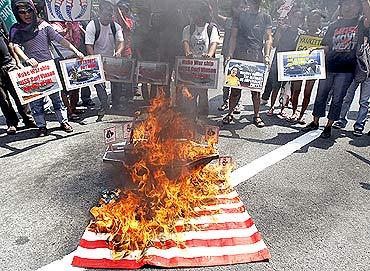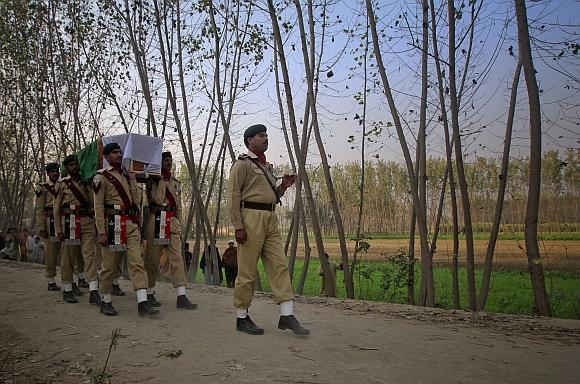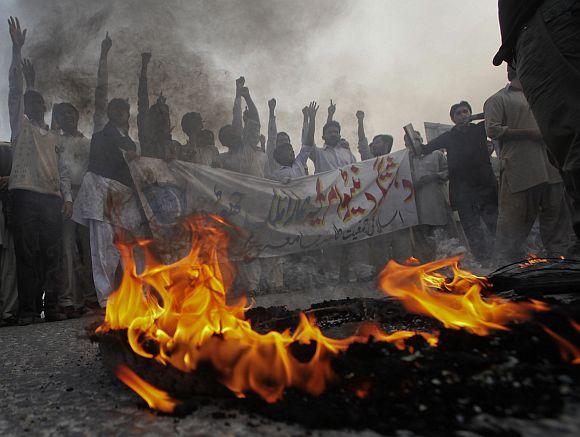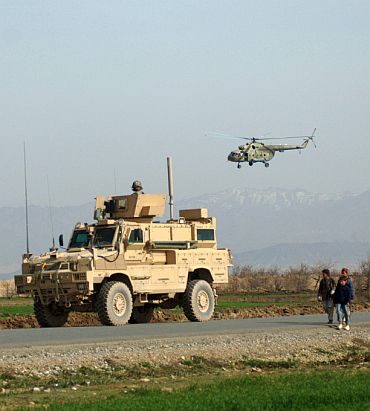 | « Back to article | Print this article |
NATO attack plunges Pak-US ties into deeper crisis
Islamabad's cooperation is crucial to ongoing American successes in the Pak-Afghan border region, but the fragile bilateral ties don't leave much room to be undermined by disruptive developments such as the latest NATO attack, says Amir Mir
The November 26, cross-border North Atlantic Treaty Organisation air strike on two Pakistan Army check posts in Mohmand tribal agency on the Pak-Afghan border and the subsequent killing of 24 Pakistani soldiers have plunged the frosty Pakistan-United States ties into deeper crisis. This has led to the suspension of vital food and military supplies (via Pakistan) for NATO forces stationed in Afghanistan.
Pak-US ties have been badly strained since May when American troops killed Osama bin Laden in a secret raid on the Pakistani garrison town of Abbottabad without prior warning, despite the fact that the two countries are supposed to be allies in the war against terror. Pakistan has said it was reviewing its alliance with the US and NATO after the lethal air strike which it branded as a violation of international law, summoning the US ambassador Cameron Munter and warning of serious repercussions.
The Pakistan government has announced the closure of its Afghan border to NATO, shutting down crucial food and military supplies for 130,000 US-led Allied Forces stationed in Afghanistan.
It was shortly after midnight on November 26 that American military helicopters rocketed and strafed two lightly manned observation posts located on the Anargai Ghakhi mountain peak in Mohmand tribal agency, known as the Salala security posts, about 2.5 km inside Pakistani territory on the Pak-Afghan border. The attack killed at least 24 Pakistani soldiers, including a major and a captain.
The check posts were established recently with a view to stop Taliban militants holed up in Afghanistan from crossing the border and staging attacks in Pakistani territory. The Salala security posts are located in the Taliban-controlled Baizai area of Mohmand tribal agency, which is a well-known hotbed of militant activity that has significantly impacted security on both sides of the border. Baizai is a known transit point and safe haven for two important commanders of the Tehrik-e-Taliban-e-Pakistan – Maulvi Faqir Mohammad and Maulvi Fazlullah alias Mullah Radio.
Click NEXT to read further...
US must apologise and take action against those responsible: Pak
Significantly, the NATO attack came hardly 24 hours after US General John Allen, commander, International Security Assistance Force, met Pakistani Army Chief General Ashfaq Kayani to discuss border control measures with a view to strengthen security at the Pak-Afghan border.
A Pakistani military spokesman said after the meeting that both the generals discussed measures concerning coordination, communication and procedures among the Pakistan army, ISAF and the Afghan army, aimed at enhancing border control on both sides of the Pak-Afghan border. The sides expressed their desire to bring back counter-terrorism cooperation to the level it was at prior to the Abbottabad raid. The visit of the top US commander comes just after the conclusion of counter-terrorism exercises between Pakistan and China. But Pak-US military ties are back to square one after the November 26 raid.
Pakistan has already has turned down a US request to unblock food and military supplies for the coalition forces in Afghanistan until and unless a formal apology is tendered and stern action is taken against those responsible for the cross-border NATO air strike. As a matter of fact, the Pak-Afghan border is poorly marked and differs from maps by up to five miles in some places.
A similar incident on September 30, 2009, which killed two Pakistani troops, led to the closure of the NATO supply routes through Pakistan for 10 days. NATO apologised for that incident, which it said happened when its gunships mistook warning shots by Pakistani forces for a militant attack.
This time round Pakistan has immediately suspended NATO/ISAF supply routes while reacting strongly. Islamabad has further given a 15-day deadline to the US to vacate the Shamsi air base in the Baluchistan province which was being used by the CIA to carry out its drone surveillance operations. Shamsi air base, the major operational centre for US drones, had actually been leased out to the United Arab Emirates which sublet it to American forces. Pakistani President Asif Ali Zardari has already turned down a request by the UAE government to extend the deadline for withdrawal of the US troops from the air base.
Click NEXT to read further...
American military delegations told to stay off Pakistan
Similarly, some already scheduled official visits of high-level Pakistani military delegations to the US have been cancelled while Washington, too, has been told that its military officials are not welcome in Pakistan, at least for now. A high-level delegation of joint headquarters was expected to leave for the US on November 28 on an official visit, which has been cancelled as a mark of protest against the latest aggression, considered by many in the military circles as an act of state terrorism by the US.
These sources said there were a few more scheduled visits to the US but those too have been cancelled and Washington has been told that Pakistani defence officials could not tour the US when the NATO forces were involved in the brutal killing of their soldiers.
The US authorities have also been conveyed that the American military delegations, which were scheduled to visit Pakistan, are not welcome.
A joint statement issued by US Secretary of Defence Leon Panetta and Secretary of State Hillary Clinton, who offered their condolences for the loss of life, backed an investigation into the incident and stressed the importance of the Pak-US partnership. On the other hand, the Western media quoted senior Western and Afghan officials as saying that a small group of US and Afghan forces on patrol in Kunar province were fired on first from positions inside Pakistani territory, prompting calls for close air support which wiped out the two Pakistani mountain posts.
The Wall Street Journal, citing unnamed Afghan officials and one Western official, has reported that the attack -- which has prompted fury in Islamabad -- was called in to shield NATO and Afghan forces targeting Taliban fighters. The fire came from remote outposts in the Mohmand region.
A spokesman for the NATO-led IASF, Gen Carsten Jacobson, told CNN that 'a technical situation on the ground ... caused the force to call for close air support and it is this close air support that highly likely caused the soldiers that perished on the Pakistani side.'
In another interview to CBS News, Gen Jacobson elaborated that Afghan and NATO forces were holding a joint exercise in Kunar, close to the border with Pakistan. 'Air support was called in, and it is highly likely that this close air support killed Pakistani soldiers,' he said. Gen Jacobson assured Pakistan that an investigation was under way into why close support had been called in. 'We need to have the technical proof of what was said at what time by whom to whom. Speed is not important, but we need to get the Pakistani side involved to find out what their involvement was,' he said.
Click NEXT to read further...
Mere apology will not satisfy Pakistan
However, the Pakistani military leadership has maintained that the attack was intentional and unwarranted. According to Major General Athar Abbas, chief spokesman for the Pakistan military, he did not believe that ISAF or Afghan forces had received fire from the Pakistani side. "I cannot rule out the possibility that this was a deliberate attack by ISAF. Let me inform you that a total of 72 Pakistani soldiers have been killed in eight cross-border attacks by the Allied Forces during the last three years. The latest episode has deeply impacted the progress made by the two countries in improving bilateral relations, forcing Pakistan to revisit its current terms of engagement with the United States," said the military spokesman.
In an interview with CNN, Prime Minister Yousuf Raza Gilani warned that there would be "no more business as usual" with Washington after the death of 25 troops in what his government has been describing as "unprovoked NATO attack on Pakistani territory". He went on to add that for the relations to continue, there had to be "mutual respect and respect for Pakistani sovereignty," which he regretted was no longer the case. Gilani, who added that an apology this time would not be enough to satisfy his nation, has also decided to take parliament into confidence about the review of relations with the US.
Analysts in Islamabad say that as the deadline for the American withdrawal from Afghanistan approaches, there are several areas in which Washington and Islamabad need to cooperate closely. The first area is security. Coordination along the Pak-Afghan border and the denial of safe havens to militants are necessary to ensure the security of all three nations.
The second area is Afghan reconciliation. Attempts to bring Taliban insurgents into the political process are necessary if there is to be any chance of avoiding a repeat of what followed the withdrawal of the Soviets in 1989. Pakistan will have to be a key player in any process that is effective and durable, but rumours are already afoot that it may boycott the Bonn conference being held in Germany.
The third area is continuous military and development assistance for Pakistan as tools to combat rising militancy.
The November 26 NATO strike has put all these aspects at risk, and dismissing it as yet another mistake or simply expressing regret will not satisfy Pakistanis in the light of such heavy troop casualties. Islamabad's cooperation is crucial to ongoing American successes in the region but the fragile bilateral ties don't leave much room to be undermined by disruptive developments such as the latest NATO attack. Such ugly episodes will only fuel more anti-US sentiments in Pakistan that will ultimately jeopardise long-term US interests in the region.



